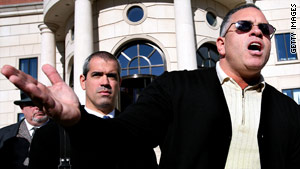
In October 2008, Michelle Kehoe drove herself and her two boys, Seth (age 2) and Sean (age 7) to Hook-n-Liner Pond near Littleton, IA. She then tied both of her boys up, duct taped their eyes, nose, and mouths, and slashed their throats leaving little Seth dead and seriously injuring Sean. She then proceeded to the edge of the pond and attempted suicide by slashing her own throat. When she did not succeed with her suicide attempt, Kehoe went to a nearby house and claimed that a man kidnapped them and killed her children. Unbeknown to Kehoe, her son Sean had survived the attack and was able to tell authorities in the hospital later that day what truly happened.
In November 2009, Kehoe stood trial for the murder of her son Seth and plead insanity. She was later found guilty of 1st Degree Murder, Attempted Murder, and Child Endangerment. In December 2009, she was sentence to life without the possibility of parole for the murder, 25 years for attempted murder, and 10 years for the child endangerment charged.
Click here for the article about the trial. This also has short video clips of the trial including testimony from both psychologists, the recorded statement from Kehoe's surviving son, and the Kwik Star surveillance video of the family shortly before the horrific crime.
Click here for the article about the sentencing hearing and how Kehoe's husband asked for leniency but the judge denied it. (Please note that the dates written in the article are wrong. Kehoe committed the crime in 2008 and the trial was held in 2009)
For me, this case hit extremely close to home, in more ways than one. First off, there is the physical aspects of the crime. Kehoe stopped with her boys at the Kwik Star in Jesup, Iowa (which is where I live) and the store clerk who testified is a person that I know.
After leaving Kwik Star, Kehoe drove down the road and stopped to let her boys play at the playground in front of St. Athanasius School. This playground is located directly behind my house (all that separates my yard from the playground is a single row of trees) and my oldest son plays there often. At this point in the time line, Kehoe purposely left her cell phone so that nobody could call for help.
From the park, Kehoe drove a few miles further to Hook-n-Liner Pond. This happens to be my husband's and my fishing spot (since this happened though, we have decided to find a new spot). It is located in an extremely secluded location so a person would have to be familiar with the area to find it. Kehoe was originally from this area. In fact, the house down the road from it used to be owned by one of her relatives.
After she committed this heinous act, the first officer on the scene was my neighbor (at that time) from across the street. He later told me that it was a very disturbing scene and he had an emotionally hard time dealing with it afterward.
This case also hit close to home for me emotionally because I am a mother of two boys as well (my oldest is 6 and my youngest is 18 months) and their ages were relatively close to the ages of Kehoe's boys. As a mother, it is hard to fathom how a person could harm their own child. Even on the most stressful of days (and believe me, there are a lot of those when you have two young ones), I still cannot even dream of hurting them. Although I have always been interested in psychology and criminology, it is this lack of comprehension that propels me to learn more in search of answers or better yet, theories as why this sort of thing happens.
I followed this case very closely because I suspected that Kehoe would attempt an insanity plea. My initial thoughts, before I knew all the facts, was that her attorney would claim it was Munchhausen Via Proxy (based on an incident prior where she drove her van with her kids inside into a river and then in this case, the fact that she ran for help after the fact and concocted the story about being kidnapped).
When I watched the trial on CNN's
In Session, I was very surprised to hear about how severe Kehoe's depression was. The psychologist for the defense testified that Kehoe had actually undergone Electric Shock Therapy treatment up to 44 times in the last 12 years. Regardless of the severity of her depression, Kehoe was not insane (by the legal definition). She knew right from wrong and there was a lot of strong evidence to support malice aforethought (which is the determining factor for Murder in the 1st Degree).
Another thing that stood out to me during the trial was Kehoe's defense attorney. When I saw her, she looked, at times, somewhat disheveled in appearance compared to the crisp, clean-cut prosecutor. Her closing arguments were also horribly delivered. She occassionally stumbled across words, at times seemed to lack confidence in what she was saying, and a few times she paused for long periods of time as if she had lost her place in her speech. Even though the evidence against Kehoe was overly abundant, it is my opinion her attorney really didn't help her case either.
You can see the closing arguments, other court segments, and a photo timeline of the Kehoe case
here as well.

 In October 2008, Michelle Kehoe drove herself and her two boys, Seth (age 2) and Sean (age 7) to Hook-n-Liner Pond near Littleton, IA. She then tied both of her boys up, duct taped their eyes, nose, and mouths, and slashed their throats leaving little Seth dead and seriously injuring Sean. She then proceeded to the edge of the pond and attempted suicide by slashing her own throat. When she did not succeed with her suicide attempt, Kehoe went to a nearby house and claimed that a man kidnapped them and killed her children. Unbeknown to Kehoe, her son Sean had survived the attack and was able to tell authorities in the hospital later that day what truly happened.
In October 2008, Michelle Kehoe drove herself and her two boys, Seth (age 2) and Sean (age 7) to Hook-n-Liner Pond near Littleton, IA. She then tied both of her boys up, duct taped their eyes, nose, and mouths, and slashed their throats leaving little Seth dead and seriously injuring Sean. She then proceeded to the edge of the pond and attempted suicide by slashing her own throat. When she did not succeed with her suicide attempt, Kehoe went to a nearby house and claimed that a man kidnapped them and killed her children. Unbeknown to Kehoe, her son Sean had survived the attack and was able to tell authorities in the hospital later that day what truly happened. 
Recent Comments